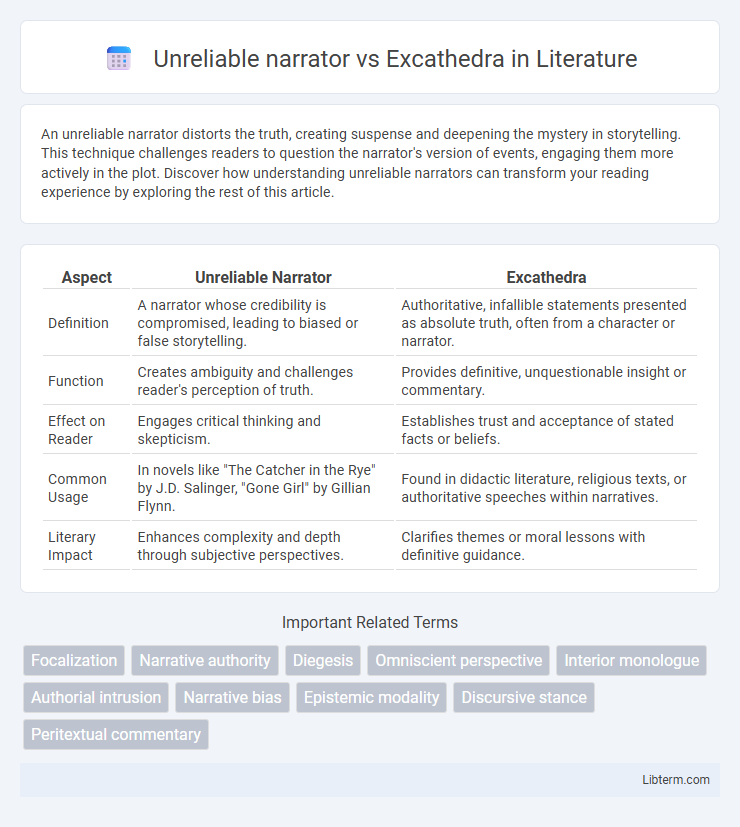An unreliable narrator distorts the truth, creating suspense and deepening the mystery in storytelling. This technique challenges readers to question the narrator's version of events, engaging them more actively in the plot. Discover how understanding unreliable narrators can transform your reading experience by exploring the rest of this article.
Table of Comparison
| Aspect | Unreliable Narrator | Excathedra |
|---|---|---|
| Definition | A narrator whose credibility is compromised, leading to biased or false storytelling. | Authoritative, infallible statements presented as absolute truth, often from a character or narrator. |
| Function | Creates ambiguity and challenges reader's perception of truth. | Provides definitive, unquestionable insight or commentary. |
| Effect on Reader | Engages critical thinking and skepticism. | Establishes trust and acceptance of stated facts or beliefs. |
| Common Usage | In novels like "The Catcher in the Rye" by J.D. Salinger, "Gone Girl" by Gillian Flynn. | Found in didactic literature, religious texts, or authoritative speeches within narratives. |
| Literary Impact | Enhances complexity and depth through subjective perspectives. | Clarifies themes or moral lessons with definitive guidance. |
Defining the Unreliable Narrator
The unreliable narrator is a narrative device where the storyteller's credibility is compromised due to bias, limited knowledge, or intentional deception, contrasting with the ex cathedra approach, which presents information authoritatively and definitively. This technique adds complexity and invites readers to question the truth and interpret the underlying reality behind the narrator's perspective. Prominent examples include Humbert Humbert in "Lolita" and the narrator of "The Catcher in the Rye," who both challenge readers' trust and highlight narrative subjectivity.
What Does "Ex Cathedra" Mean?
Ex cathedra" is a Latin phrase meaning "from the chair," used to describe authoritative statements made by the Pope on matters of faith and morals, considered infallible within the Roman Catholic Church. In contrast, an unreliable narrator is a literary device where the storyteller's credibility is compromised, leading readers to question the truthfulness of the narrative. Understanding "ex cathedra" highlights its role as a definitive source of doctrine, unlike the subjective and often deceptive nature of unreliable narration in literature.
Key Differences: Subjectivity vs. Authority
An unreliable narrator presents a narrative colored by personal bias, misperception, or intentional deception, emphasizing subjectivity and ambiguity in storytelling. In contrast, ex cathedra statements convey authoritative, infallible declarations, often issued by a recognized expert or institution, asserting objective truth without room for doubt. The key difference lies in unreliable narrators fostering interpretive uncertainty, whereas ex cathedra pronouncements demand unequivocal acceptance based on established authority.
Literary Origins of Unreliable Narration
Unreliable narration originated from literary experimentation in 20th-century modernist literature, where authors like Ford Madox Ford and Edgar Allan Poe challenged traditional narrative authority by presenting subjective, biased perspectives. This contrasts with the concept of ex cathedra, which denotes authoritative, infallible declarations, primarily in theological contexts. The unreliable narrator disrupts readers' trust, creating ambiguity and demanding active interpretation, whereas ex cathedra asserts definitive truth.
Historical Context of Ex Cathedra Statements
Ex Cathedra statements originate from the Roman Catholic Church's doctrine of papal infallibility, formally defined during the First Vatican Council in 1870, asserting that the Pope is preserved from error when proclaiming dogma on faith or morals. In contrast to unreliable narrators in literature, whose credibility is intentionally questionable, Ex Cathedra pronouncements carry authoritative weight and are considered infallible within the Church's magisterial teaching authority. This historical context underscores the definitive nature and doctrinal influence of Ex Cathedra declarations, shaping Catholic theological interpretation and ecclesiastical authority.
Exploring Examples in Classic Literature
In classic literature, unreliable narrators such as Humbert Humbert in Vladimir Nabokov's "Lolita" distort truth through biased or deceitful perspectives, challenging readers to discern reality from fiction. Ex cathedra narration, characterized by authoritative and infallible tone, is exemplified by narrators like Jane Austen's in "Pride and Prejudice," who present facts with assured objectivity and moral clarity. These contrasting narrative techniques shape reader interpretation and highlight the thematic complexity in storytelling.
Impact on Reader Trust and Perception
An unreliable narrator challenges reader trust by presenting a skewed or deceptive version of events, forcing audiences to question the truth and actively engage in interpretation. In contrast, an ex cathedra statement conveys absolute authority and certainty, establishing firm trust and limiting ambiguity in the reader's perception. The interplay between these narrative approaches shapes how readers process credibility, influence emotional investment, and determine the reliability of the conveyed information.
Uses in Modern Storytelling
Unreliable narrators create immersive, ambiguous narratives by distorting truth and challenging reader perception, often used in psychological thrillers and literary fiction to enhance suspense and complexity. Excathedra narration, characterized by authoritative and infallible storytelling, is prevalent in epic fantasy and historical fiction to establish clear world-building and unambiguous narrative direction. Contemporary authors leverage unreliable narrators for narrative tension and multiple perspectives while employing excathedra narration to deliver definitive, immersive lore.
Cultural and Psychological Implications
Unreliable narrators challenge readers' perceptions by revealing the subjective nature of truth, often exposing cultural biases and psychological complexities within characters. Ex cathedra pronouncements assert absolute authority, reflecting cultural structures that prioritize institutional power and infallibility. The interplay between these narrative modes highlights the tension between individual psychological experience and collective cultural doctrines.
Choosing Between Unreliable Narrator and Ex Cathedra
Choosing between an unreliable narrator and ex cathedra narration hinges on the desired narrative control and reader interpretation. An unreliable narrator introduces ambiguity and complexity by providing subjective or misleading perspectives, fostering deeper engagement through reader skepticism. Ex cathedra narration offers authoritative, omniscient commentary that guides the audience with definitive insights, ideal for conveying clear, unambiguous themes or moral lessons.
Unreliable narrator Infographic

 libterm.com
libterm.com